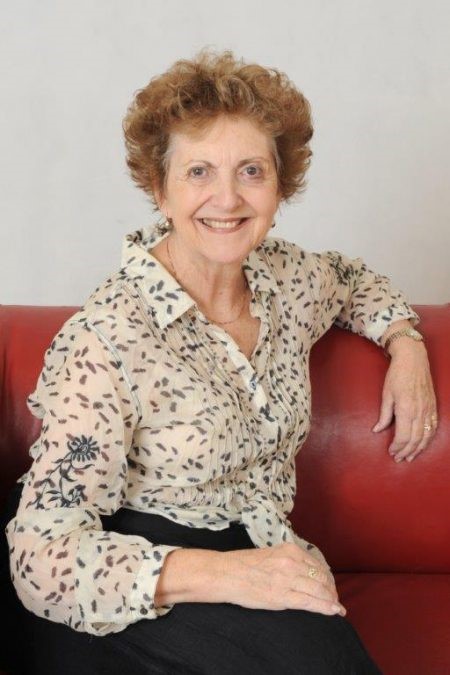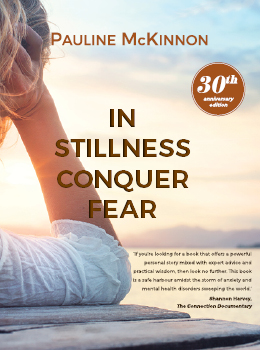Pauline McKinnon – Busting the Anxiety Myths
 Author and psychotherapist, Pauline McKinnon has specialised in anxiety relief for some 30 years. Based in Melbourne, Pauline leads the way in helping others through the therapeutic meditation originated by renowned psychiatrist Ainslie Meares. As founder of the Stillness Meditation Therapy Centre in Kew, Victoria, Pauline states that it is no surprise that one in three people will suffer from anxiety at some point in their life because it is the most common mental health issue in Australia. Despite this, it is one of the most misunderstood illnesses in society today.
Author and psychotherapist, Pauline McKinnon has specialised in anxiety relief for some 30 years. Based in Melbourne, Pauline leads the way in helping others through the therapeutic meditation originated by renowned psychiatrist Ainslie Meares. As founder of the Stillness Meditation Therapy Centre in Kew, Victoria, Pauline states that it is no surprise that one in three people will suffer from anxiety at some point in their life because it is the most common mental health issue in Australia. Despite this, it is one of the most misunderstood illnesses in society today.
“I have suffered from anxiety. I know first-hand how debilitating it can be and the impact it can have on a person’s life,” Pauline said today.
“And I claim to be the first person in the world to write a book on my experience. In Stillness Conquer Fear is still one of the leading books on the topic of anxiety. In my book, not only did I record my experience of anxiety, I also included a sensitive understanding of such suffering, advice on dealing with its impact and most of all, a powerfully effective way of overcoming this life limiting reaction.
“When assisting others, I actually draw on my own anxiety and life experience. It helps to be able to put yourself in the shoes of the person you are working with. Because, having walked that walk, I know exactly the fear-driven feelings and the apparently never-ending cycle of being lost, afraid, stuck in a quagmire of emotional pain. And despite raised awareness of anxiety today and many treatments put forward, millions of sufferers remain in that unpleasant emotional confusion.
“While as a society we are getting better at talking about anxiety and how it affects us, there are still many ridiculous myths getting about. Some of these are quite hurtful and damaging.”
Pauline has put together a list of facts to help dispel some of the myths around anxiety in the hope of offering a sound understanding to better educate the anxiety sufferer.
1. Anxiety is just another form of stress
Anxiety and stress are two completely different things. Stress nearly always occurs due to a specific external situation. When the situation passes, so does the feeling of stress. Anxiety on the other hand cannot be solely attributed to an external situation. It is an emotion that is often triggered for no apparent reason. Anxiety is all consuming and creates an overwhelming sense of fear.
2. Anxiety is rare
Anxiety is not rare. In fact, it is very common. It affects one in three people during some stage of their life. It also affects both men and women, although statistics do show that women tend to present more often with anxiety than men.
3. People with anxiety should avoid things that make them anxious
This is not the case. Avoidance unfortunately reinforces anxiety and can result long term in the full agoraphobic reaction with an ever-worsening anxiety as one’s constant companion.
People with anxiety are usually highly functional and can, albeit with some difficulty, still achieve the things they need to achieve.
4. Medication is the best treatment for anxiety
This is an unfortunate assumption. While medication can be helpful to help some cope with their anxiety symptoms, studies show that certain relaxing meditation practices, psychotherapy and for some, cognitive behavioural therapy have the advantage of assisting people to gain insight, personal understanding and self-empowerment, all of which bring far better results than medication.
5. You can just grow out of anxiety
Anxiety is a persistent feeling. You don’t just grow out of it and it can change the way it affects you over time. Personal and professional experience has taught me that the only way to effectively deal with anxiety is through deep physical and mental relaxation to restore equilibrium within the nervous system. With this practice correctly followed, over time, anxiety symptoms reduce, personal confidence increases, and life begins to be lived differently.
6. Panic attacks are just drama tantrums
Panic attacks are real, and they can be frightening. They are a physiological and hormonal response from the body triggered to protect itself from a perceived highly threatening situation. Symptoms of a panic attack include dizziness, shortness of breath, chest pain, alarming feelings of unreality and overwhelming fear. Many people who experience panic attacks feel they are having a heart attack and find themselves rushed to emergency.
7. Panic attacks make you pass out or lose control
Passing out or fainting usually happens when a drop in blood pressure occurs This does not necessarily happen during a panic attack. In fact, a panic attack triggers an increase in your heart rate and blood pressure. In reality, the sufferer rarely loses control, but instead experiences an overwhelming fear of losing control which of course, alerts the panic reaction.
8. Deep breaths will make anxiety go away
Anxiety causes physical responses such as dizziness, loss of balance, nausea, increased heart rate and chest pain. Some people sweat profusely and even feel like they are choking. Often people are recommended to breathe deeply into a brown paper bag to assist the onset of panic. However, while such a recommendation might bring some temporary comfort, this action in itself, is not a ‘cure’ for chronic anxiety.
9. Anxiety is always related to sexual problems
This is another myth. Let’s remember that anxiety is largely about personal temperament, personal threat and personal confidence. As such, these elements of living can cross many thresholds and for some, sexual issues may be one of those thresholds. As with any emotional reaction, life experience is filled with many, many potentially anxiety producing incidents or challenges and rarely limited to one major cause.
10. Some people are more prone to anxiety
Anxiety can strike anyone at any time for no reason whatsoever. There is evidence however to suggest that heightened anxiety is hereditary and can be passed down through the genes. The matters of temperament, conditioning and perception of life can all contribute to the individual’s response to life. But as with all living things, these influences are not ‘set in concrete’. People can learn, grow and change!
“Anxiety is treatable, and people can live successful and fulfilled lives – especially from having learned and grown through anxiety,” Pauline added
“I am living proof that you can conquer the anxiety obstacle. With the right treatment and support you can enjoy a wonderful anxiety free existence.
“The key is to ensure that we acknowledge anxiety – without shame or embarrassment. There is good help available to deal with these issues. If we get help, and if we follow through with patience, we can recover. We also need to ensure we’re kind and considerate towards others when it comes to anxiety. There are many people around us living with anxiety who are silently suffering or quietly coping. Regardless, the more we understand anxiety, the better we will all be as a society.”
Pauline's book, In Stillness Conquer Fear, is considered to be one of the best 'self-help' books available on the market that deals with anxiety. Not only does it provide insight into Pauline's extraordinary experience with anxiety, it also includes valuable tips and practical guidance on how to cope, move forward and get on with life.
Click here for more information on Pauline's book In Stillness Conquer Fear.


Join the discussion
Let your opinion be heard, add your comment!